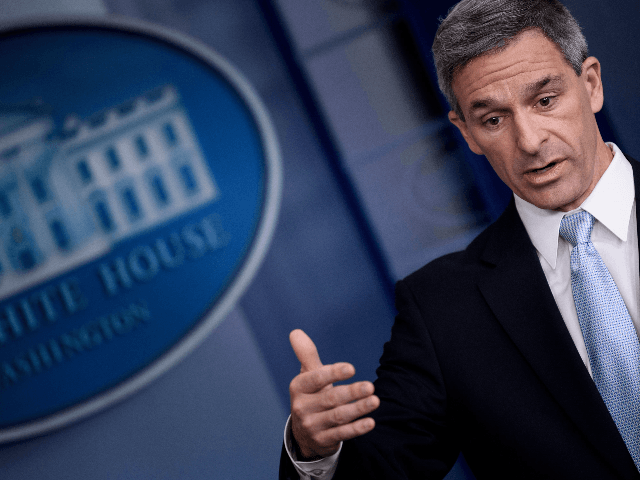Under a regulation set to be enforced by the Trump administration, self-sufficient immigrants who are proficient in English will be favored for green cards to permanently remain in the United States over those who are non-English speakers and reliant on welfare.
During a press conference on Monday, Acting United States Citizenship and Immigration Services (USCIS) Director Ken Cuccinelli said the Trump administration will establish what is known as the “Public Charge” rule — a regulation whereby legal immigrants would be less likely to secure a permanent residency in the U.S. if they have used any forms of welfare in the past, including using subsidized healthcare services, food stamps, and public housing.
These immigrants subject to the rule are technically mostly nonimmigrants in the U.S. and foreign nationals, including illegal aliens seeking to adjust their immigration status, temporary foreign guest workers wanting a green card, and foreign nationals looking to be sponsored for a green card by their employer or U.S.-based relative.
The rule will take into account a number of negative and positive factors when assessing an immigrant’s qualification for a green card. Among the positive factors that will help secure a green card for an immigrant is their ability to speak English.
“DHS will consider whether the alien is proficient in English or proficient in other languages in addition to English as part of the public charge inadmissibility determination,” the regulation states. “People who spoke a language other than English at home were less likely to be employed, and less likely to find full-time work when employed.”
Today, there are roughly 65 million U.S. residents speaking a foreign language at home. In the nation’s largest cities, New York City, Houston, Los Angeles, Chicago, and Phoenix, nearly half of the residents speak a foreign language at home. In Los Angeles, alone, almost one-in-six residents speak a foreign language at home.
Self-sufficiency is similarly a positive factor that will make an immigrant more likely to secure a green card over those who are reliant on welfare and deemed a “public charge.”
For example, foreign nationals in the U.S. who currently pay for their own non-subsidized health insurance would be more likely than nationals on Obamacare or Medicare to be approved for permanent residency in the country.
USCIS will take into account an immigrant’s work history and total ability to earn a sufficient living in the U.S. without relying on taxpayers.
“The ability of the alien to earn sufficient income to pay for basic living needs (i.e., food and nutrition, housing, and healthcare), as evidenced or impacted by, for example, the alien’s age, health, work history, current employment status, future employment prospects, education, and skills” will be considered in weighing whether an immigrant is approved for a green card, according to the regulation.
The enactment of the Public Charge rule comes after Trump signed an order set to begin in September that enforces existing 1996 laws signed into statute by then-President Bill Clinton. The order mandates that a family member or business sponsor of a legal immigrant looking to permanently resettle in the U.S. is responsible for paying back the welfare costs previously used by that immigrant.
For example, if a visa holder has used $10,000 in food stamp benefits while living in the U.S., when a family member sponsors them for a green card, that family member will be notified of the legal immigrant’s welfare costs to taxpayers and will be obligated to pay back the amount. If the sponsor of a legal immigrant does not pay the welfare cost, the Treasury Offset Program will take the money out of the sponsor’s taxes for that year.
The order also ensures that the personal income of a legal immigrant’s sponsor is taken into consideration when a legal immigrant is applying for federal welfare. Currently, only the income of legal immigrants is considered by federal agencies when applying for public benefits. Under the rules set out by Clinton’s 1996 law, the Trump administration will make certain that the income of both the legal immigrant and their sponsor is considered when applying for benefits.
As Breitbart News reported, the majority of the more than 1.5 million foreign nationals entering the country every year use about 57 percent more food stamps than the average native-born American household. Overall, illegal and legal immigrant households consume 33 percent more cash welfare than American citizen households and 44 percent more in Medicaid dollars. This straining of public services by a booming 44.5 million foreign-born population translates to the average immigrant household costing American taxpayers $6,234 in federal welfare.
John Binder is a reporter for Breitbart News. Follow him on Twitter at @JxhnBinder.

COMMENTS
Please let us know if you're having issues with commenting.